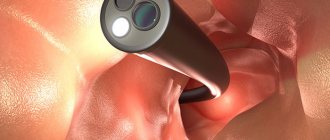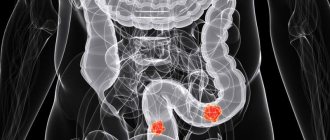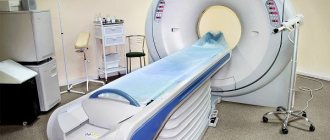How is the colonoscopy procedure performed?
The colon is examined using an endoscope. In a simplified sense, this is a thin hose up to 1.4 m long with a built-in video camera and light source. The hose is inserted into the anus and advanced through the intestines. At the same time, air is pumped into the colon to straighten the folds and improve visibility. The image from the camera is transferred to the computer screen. This is how the doctor visually examines the colon mucosa.
If there are suspicions about the condition of the mucosa, special instruments are inserted through an endoscope to take a section of tissue for biopsy. Polyps in the intestines are removed in the same way. The procedure lasts 30-40 minutes. The patient is in a lying position on his left side with his knees pressed to his chest, then on his back. For special indications, the procedure is performed under anesthesia.
Preparing for a colonoscopy
You should be very careful when preparing before the procedure. This applies to special dietary restrictions and cleansing procedures. From your diet, you should pay attention to excluding foods that produce an increased amount of gases. It is not allowed to eat legumes, sweets, flour and starchy foods, and alcohol is also prohibited. You should avoid salty, spicy, sweet, fatty, fried and smoked foods.
Colon cleansing is done with the help of certain medications.
If the procedure is performed on a patient during menstruation, then care should be taken to perform hygienic procedures and use highly absorbent tampons.
Possible negative consequences
If it is impossible to reschedule the procedure for another day, a colonoscopy is performed during menstruation. There are usually no side effects, but there is always a risk. During menstruation, the mucous membrane of the genital organs and adjacent tissues acquires increased sensitivity.
Important! There is an increased chance of tissue damage and bleeding during a period procedure.
Many women complain of bloating and tension in the abdominal area, which makes the procedure more painful. An endoscope can also cause increased monthly bleeding. Negative consequences do not affect the effectiveness and veracity of the research results.
How is the examination carried out?
A colonoscopy takes about 30 minutes, regardless of whether a woman is menstruating or not. After preparing for the procedure, the patient needs to put on a special shirt and lie on the couch in the “side” or “on all fours” position.
Before using an anesthetic (if it is a gel), the rectal area is treated with antiseptic drugs. Thus, the possibility of intestinal infection is reduced.
The diagnostician inserts the tip into the anus and pushes it deeper. The entire procedure is performed with extreme care to reduce pain symptoms and prevent damage to intestinal tissue.
The examination is carried out using a device - a colonoscope.
At the end of the procedure, the doctor removes the colonoscope and gives the patient time to recover. If general or partial anesthesia was used, the woman remains for a day in a medical facility to monitor her health.
Doctors' opinion
Doctors are unanimous in their views on the need for research. If there is a suspicion of serious intestinal pathology, colonoscopy is definitely performed during menstruation, without waiting for the end of bleeding. Sometimes a delay of 1-2 days may be incompatible with life. This applies not only to oncology, but more often to heavy bleeding from the anus, which depletes the body and greatly reduces hemoglobin levels.
Doctors believe that only planned examinations can have flexible deadlines; unscheduled examinations should not have them. A woman with a regular menstrual cycle should plan a convenient time for a colonoscopy herself, so as not to feel psychological discomfort.
On what days of the menstrual cycle is the procedure allowed?
If there are no indications for a colonoscopy during menstruation, then it is best to carry out the procedure either immediately after they stop, or a week before the start. So, with a cycle length of 28 days, the most suitable days will be 6–21 days, when there are no menstrual flows and PMS has not begun, which is important if a woman has pain during this period.
The examination is carried out on an empty intestine, which requires special preparation. It is safer to do this after menstruation, since there is no risk of increased bleeding. 3-5 days before the procedure, it is necessary to exclude from the diet fresh fruits and vegetables, cereals, and anything that causes constipation or bloating. It is allowed to eat meat, dairy products, and broths. 16 hours before the examination you cannot eat, you can only drink. The day before, a cleansing enema is performed or the drug Fortrans is taken. In the morning, before going to the doctor, you need to repeat the enema (even if you are taking medication).
Reviews about colonoscopy during menstruation
Fedorova Olga Olegovna, 48 years old, Moscow I had to do a colonoscopy during my period, as I was in the hospital for examination. Nothing terrible, except personal experiences. The procedure was done without anesthesia, it was not painful, but unpleasant. To be emotionally calmer, I used sanitary tampons. The main thing is to properly prepare for the study - cleanse the intestines, not eat for a day, and drink a sedative. The stomach hurts a little while advancing the endoscope, but the nurse periodically pressed on the painful areas and it became easier. We did it in 25 minutes. Alekseeva Tamara Sergeevna, 39 years old, Bryansk My attending physician did not want to do a colonoscopy during menstruation, so he rescheduled it for a week later. He motivated by the fact that there is a risk of injury to the mucous membrane and can provoke severe blood loss. Since the clinic is private and small, they do not have a hospital, which means that in force majeure circumstances the patient needs to be taken to the hospital, and this is time. But I’m glad, because I was very worried; emotions are always at their limit during menstruation.
Indications and contraindications for colonoscopy during menstruation
Video colonoscopy is an invasive diagnostic procedure that is used to diagnose and treat intestinal diseases. It consists in the fact that after preliminary preparation, an endoscope with a camera at the end is inserted into the patient’s rectum, which is slowly moved upward, repeating the curves of the organ.
When can you do a colonoscopy during your period?
- if you suspect malignant or benign tumors in the intestine (to clarify the diagnosis and perform a biopsy);
- as a diagnosis and removal of multiple, single, fast-growing polyps;
- in the presence of Crohn's disease or nonspecific ulcerative colitis (to confirm the diagnosis, to monitor the effectiveness of treatment);
- if streaks of blood and mucus appear in the stool.
The study is also carried out in case of complaints of frequent constipation, repeated episodes of intestinal obstruction, in case of causeless anemia or fever. In addition, fibrocolonoscopy can be used to remove small tumors, polyps, stop bleeding, and take tissue for histological analysis.
The answer to whether it is possible to do a colonoscopy during menstruation is positive. Menstruation is a natural process for the female body and will not interfere with the examination. However, if you have severe pain during your period or in case of psychological discomfort, you should sign up for the procedure after it ends.
Contraindications to the study:
- myocardial infarction, angina attacks;
- inflammatory lesion of the peritoneum (peritonitis);
- states of shock;
- strangulated inguinal hernia, acute colitis;
- internal massive bleeding;
- severe renal, cardiopulmonary or liver failure;
- rupture of the intestinal wall.
The patient's presence of an artificial heart valve or recent abdominal surgery are relative contraindications, and menstruation does not apply to them.
Cleansing with laxatives
To cleanse the intestines with Fortrans, you need to use several sachets. The dosage is calculated as follows: for 15-20 kg of weight - 1 sachet, dissolved in 1 liter of water. Thus, if a person weighs 60 kg, he needs to dilute 3-4 sachets in 3-4 liters of water. The solution is drunk in small portions over 12 hours.
Duphalac is bred according to a different scheme. Pour 200 ml of the drug into 1 liter of water, which is 1 standard bottle, and stir. Drink within 3.5 hours. The medicine has a mild laxative effect, sufficient for complete cleansing of the intestinal cavity.
Some patients prefer to use Flit because it does not require dilution. The volume that you need to drink in 2 doses is 90 ml, and this is not that much. The liquid is divided into 2 parts of 45 ml. The first portion is drunk in the morning and washed down with 1 liter of warm water, the second in the evening, and 4-4.5 glasses of liquid are also consumed.
We suggest that you familiarize yourself with Seborrheic dermatitis treatment of the scalp with folk remedies
The most complete and high-quality intestinal cleansing is achieved using the drug “Fortrans”, so doctors usually recommend it. None of the medications listed have any side effects, and they can be taken if you are having a colonoscopy during your period.
After the procedure
In some cases, after a colonoscopy, moderate amounts of blood discharge from the anus are observed. This phenomenon is considered normal and should not be feared.
If bleeding occurs profusely and does not go away within 3 days, you should immediately go to the doctor. Also, over some time, the air that entered the intestines during the colonoscope will escape.
You may experience a feeling of bloating; such side effects of the procedure are also considered normal.
Colonoscopy is a necessary procedure, although the technique cannot be called pleasant. Indulging your own disgust, you shouldn’t refuse to do it. What if a “force majeure” event occurred before the appointed day?
A classic situation - a person made up his mind and fully prepared for the “hour X”, but circumstances treacherously played against him. Refuse, at the risk of allowing the disease to take over your own “ego”? Perhaps, if the reason is incompatible with the appointed time: an accident with severe injuries, a severe illness of infectious origin, sudden family reasons (funeral of a loved one, a sharp deterioration in the health of parents, a wedding) - in these cases, the examination must be rescheduled for a convenient time.
What to do if the reason is relative in nature, allowing the study to be neglected? Such excuses include “calendar days” for women, in other words, menstruation. Periods can begin at the wrong moment, when the cycle is not stable. Should you refrain from intestinal examination?
The menstrual cycle is monthly hormonal changes in the female body, provided by nature for the conception of offspring. On average, the duration is 28 days with an error of 3-4 days in both directions. The interval is divided into 3 phases:
- formation of a follicle with a maturing egg;
- ovulation - the cell leaves the follicle, travels through the tubes and enters the uterus;
- if fertilization does not occur, “rejection of the endometrium” or menstruation occurs.
Detachment of the “baby cradle” is not a painless process, sometimes accompanied by nagging pain in the lower abdomen, weakness, nausea and vomiting. On days of heavy bleeding, you feel dizzy and have poor coordination of movements.











